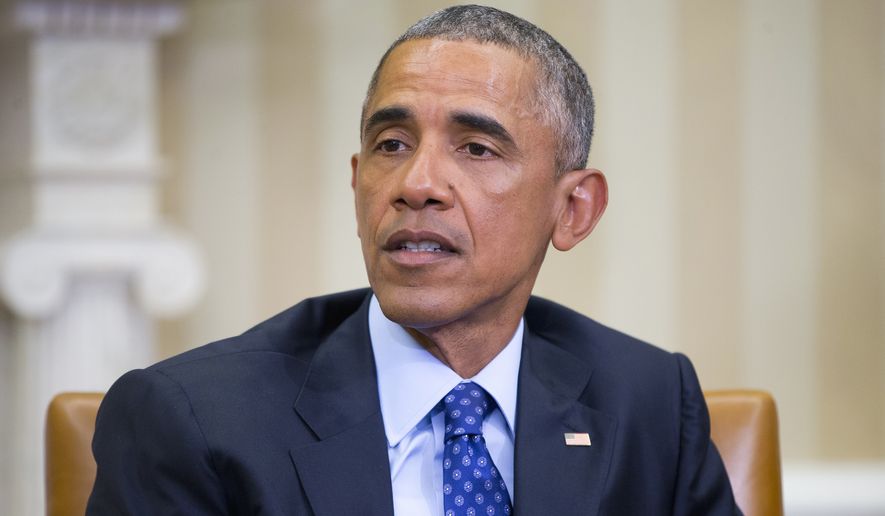This week’s Keystone pipeline lawsuit may deliver the death blow to a seemingly unrelated Asian trade deal, with environmentalists and labor unions saying a Canadian company shouldn’t be allowed to use international trade agreements to force changes in U.S. energy and environmental policy.
TransCanada, the company that had sought to build the Keystone XL pipeline to carry oil from Alberta into the U.S., filed a lawsuit Wednesday claiming Mr. Obama’s rejection of the plan violated the Constitution, and filed a separate notice of intent to complain under the 1990s-era North American Free Trade Agreement.
While some environmentalists said the trade complaint is a desperation move, others are taking it seriously, saying if the company is successful, it would be evidence that trade deals — particularly the Trans-Pacific Partnership, which Mr. Obama negotiated earlier this year — would allow international corporations to override the will of U.S. policymakers.
“Here is exactly the attack on U.S. environmental policy that the president insisted could never happen under the controversial Trans-Pacific Partnership trade deal,” said Lori Wallach, director of trade issues at Public Citizen, a watchdog.
The TPP was already on the ropes.
Just months after Republicans helped grant Mr. Obama fast-track negotiation powers to finish the TPP negotiations, GOP leaders said they were disappointed with the final deal the president won in the 12-nation talks. Democrats, meanwhile, have been overwhelmingly opposed from the start.
If the two parties join together, they could scuttle Mr. Obama’s chance to win approval of the legacy-building agreement.
The White House cast doubt on TransCanada’s trade claim Thursday, and said the U.S. has a good track record of winning these kinds of disputes before international trade panels.
“We never lost a case. I think that is an indication that we have not seen corporations be able to use it effectively to change or alter U.S. law,” White House press secretary Josh Earnest said. “Our strong record in that venue actually, I think, is a strong argument for precisely why Congress should approve the Trans-Pacific Partnership.”
Mr. Obama is expected to plead for approval of the TPP in his State of the Union address next week.
But he’s got some major work to do with Republicans, and even more to do with his own party.
House Minority Leader Nancy Pelosi said Thursday she’s still reading the massive text of the agreement, and Democrats are holding meetings to study up on what’s in the deal.
Mrs. Pelosi said the outcome of the vote could turn on when Republicans bring it to the floor for votes in the House and Senate.
New House Speaker Paul D. Ryan said Republicans are also still making up their minds.
“Most of our members have not had a chance to wade through it all. I haven’t had the chance to go through it all. So a lot of people are still reserving judgment,” he said. “It’s an enormous agreement. The agreement has enormous potential, but we’ve got to get it right, and we’re going to take the time we need to get it right.”
The closer the vote gets to November’s presidential election, the tougher it could be to secure passage.
Democratic presidential candidates have come out against the agreement, with the major dispute being over how Mrs. Clinton can square her newfound questions now with her vociferous support for the deal when she was involved in negotiating the deal as Mr. Obama’s top diplomat.
“You can’t be for the TPP and against the TPP,” Sen. Bernard Sanders, her chief opponent in the Democratic primary, told MSNBC this week.
GOP front-runner Donald Trump said he’s adamantly opposed to the deal, and on Thursday, speaking on the Laura Ingraham Show, demanded fellow candidate Sen. Marco Rubio take a firm position. Mr. Rubio had previously seemed supportive of a deal, but that was before Mr. Obama released the final text.
He has since told The Wall Street Journal he hasn’t decided whether to support the TPP.
TransCanada’s NAFTA complaint is based on the loss of value in its investment in the pipeline. The company says it will seek $15 billion in compensation for Mr. Obama’s refusal to permit the pipeline, saying he politicized the decision.
TransCanada pointed to other projects from Mexican and American companies that were quickly approved, and said they were substantially the same as the Keystone XL pipeline. The company said the Obama administration broke a part of NAFTA that requires equal treatment of all parties.
• Stephen Dinan can be reached at sdinan@washingtontimes.com.




Please read our comment policy before commenting.